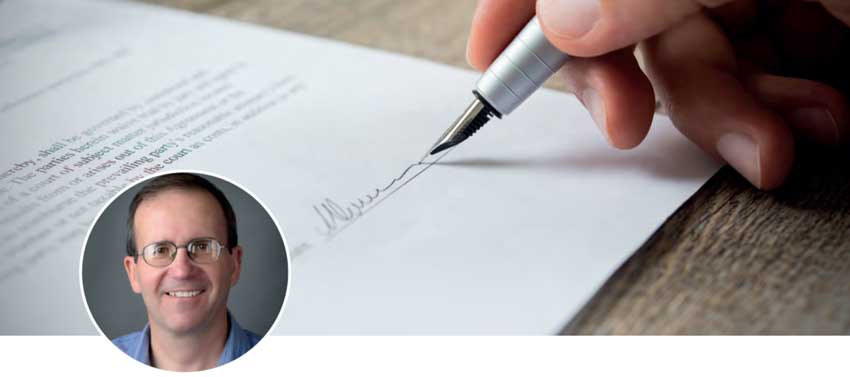Softline, a leading global information technology (IT) solutions and services provider, featured Parascript CEO Alexander Filatov as a special guest in their March Softline Direct Magazine and the Softline blog article in Russian. Here is the summary in English (not a literal translation) of this interview.
Softline: What, in your opinion, are the main milestones of the company’s development? Can you name 3-5 important events that occurred in the company’s business in its entire history?
Parascript CEO Alexander Filatov: The first event in Parascript’s history, which I consider important, did not lead to any success from the point of view of business. We participated in a competition to find the best solution for automating the population census in the U.S. These were handwritten forms, where it was necessary to automatically recognize many data elements like name and surname, address, eye and hair color, age, race, and so on.
We did not only win, we crushed the competition. Our result was 94% of recognized fields with an error of less than 1%, and the company that took the second place, lost to us by more than 10%, which meant that they had about three times more costs for manual data entry to achieve our same results. At that time, all our developers were located in Moscow. Unfortunately, US Census Bureau couldn’t sign a contract for calculating the results of the national census with a company where all the developers were based in Moscow (the Cold War was over, but still…). However, the result meant that—at least in this narrow area of pattern recognition—we had proved to ourselves that we were the best in the world.
The second milestone in the history of our company was the automation of a major postal carrier in the U.S. When we started this activity, 80% of envelopes with handwritten addresses had to be processed manually. Over several years, we increased the percentage of automatic recognition of envelopes with handwritten addresses from 20% to 96%. Today, one postal center can do the work of 200 postal centers that manually entered data before automation. Today, our address recognition programs operate in the US, and also in Germany, England, Italy, Russia and in many other countries.
Softline: You say that Parascript software allows your customers to save billions of dollars each year. This is a very impressive figure. Could you explain how you calculate this?
AF: The arithmetic is actually quite simple—multiply the number of documents (envelopes, parcels, bank checks, medical and accounting forms, etc.) that are automatically processed by our technology, and do not require manual data input, by the cost of manual input of one document. Every year, our programs automatically handle tens of billions of postal items, tens of billions of bank checks, medical, insurance and accounting forms, in many countries around the world. Manual processing of each such document is usually a few cents. The result is billions of dollars in annual savings.
Softline: What is the concept of digitization, digital transformation for you? What is the key to the successful implementation of this strategy?
AF: Initially, digitization basically was understood to mean translating information from paper form to digital in order to achieve savings in processing information and in archiving documents. Later, everyone realized that this was not the most important aspect of digitization. The electronic form of information storage allows for effective access to information and also facilitates the effective extraction of analytical information necessary for the optimization and automation of management processes.
Softline: How do you implement digitalization in the company? What is the most difficult part of this process? And what are its benefits?
AF: We are a relatively small company, so it has been really straightforward for us to achieve a high degree of digitalization. We tried to do without paper documents from the very beginning. Almost any document in our company is born, edited, distributed and stored electronically. We communicate with our partners and clients in the same way. If one of our partners delivers paper documents to us, we immediately translate them into electronic form.
The main benefits of this approach for Parascript is that the process of searching for the necessary information, distributing it within the company, working together on documents, extracting and processing the original information into more abstract forms (e.g., into neural networks that are integral to our products) becomes much more simple and effective.
Softline: How do you see the future of the market in which you work? The top management of the company are specialists who come from Russia. But the main business is in the USA. Can you compare the situation on the IT market in the US and Russia?
AF: My answer depends upon your time scale. If we look forward 5 to 10 years, the changes in the current situation will appear quite smooth. States and companies are quite inertial. The future without paper, for example, has been predicted for the past twenty years at least. Still, we are not there yet, and the progress to date shows that this process will take several more decades, but it’s happening. The number of postal items in the United States has decreased, roughly, by half from its peak. The number of bank checks has already decreased by about two-thirds from its peak.
All the major activities in document circulation for medicine, finance, etc. are conducted in electronic form. However, there are significant niches of markets where paper documents are still important. At the same time, there are tasks of automatic processing of documents, which not so long ago required exclusively manual processing. These, in particular, are the tasks of checking the integrity of a collection of documents (e.g., for a mortgage loan, to verify all required documents are present in the packet of documents to qualify for a mortgage loan). And, of course, there is a significant increase in requests to extract analytical information from these documents.
If we talk about the correlation of IT markets in the US and Russia, bureaucratic requirements for document circulation in Russia lag behind world standards. I must say that companies from Russia are practically the only ones in our business that require the exchange of documents in paper form.
Another thing that I would like to note is the current focus of the IT market on artificial intelligence. In the U.S. and in other countries, huge resources are being invested in AI. I know that a number of companies in Russia are seriously investing in this direction, too. For example, companies such as Yandex and the Skolkovo Institute of Technology are focused on AI and machine learning. In the U.S., this direction is seen as the backbone for the IT market as a whole.
Softline: Identify one or two of the most unique solutions created by your company, of which you personally are proud.
AF: That’s tough—we have many solutions that we are proud of, and it’s almost impossible to select one or even two. Personally, I like Parascript’s signature verification technology. Our algorithm can distinguish a valid signature from professional forgery. Our product is used to verify signatures on bank checks, as well as to verify people’s signatures during elections. In the U.S., people can vote-by-mail, in which case verification is required so that the signature on the voting ballot coincides with the voter’s signature in the database. Inside our company, we pitted our employees against our product to verify signature authenticity, and our employees lost to our algorithm by a crushing score.
I also really like our document classification technology. Imagine that you are receiving a continuous stream of documents without any separators between the documents. Your task is to separate the documents from each other and classify the documents into predefined types. What makes this task particularly interesting is that in a real stream, in addition to several hundred predefined document types, there can be an unlimited number of documents, the types of which are simply unknown. A very challenging task, and our document classification automates this process leveraging machine learning.
Softline: Your solutions are based on artificial intelligence technology. How do you apply AI personally in your work and your personal life?
AF: You know, when you are immersed in AI technology almost every day, you want to escape it at home. But seriously, nowadays AI brings the greatest benefit when it is used for specialized applications. One example is the applications for processing documents that our company develops. Another business area that successfully uses AI is customer support. When you call the airline to solve a flight problem, you cannot immediately talk with a person. You spend a few minutes communicating with the airline’s speech recognition system. For me, that’s always a few unpleasant minutes because today’s customer support AI tends to be miserable at understanding accents. Naturally, in the near future, this situation is likely to become much better.
Softline: As a leader, what do you do if you are out of inspiration or are faced with a desperate situation?
AF: I have to admit that I’ve been lucky in life. After defending my dissertation, I applied for a job at two places, and I was accepted at both. The first was a bank where I was offered a salary three times more than at the second choice, Paragraph, a parent company of Parascript. Paragraph was engaged in handwriting recognition, which intrigued me, so my choice was obvious. Since then, inspiration is always with me when I am at work. I guess I just enjoy what I do.
Regarding desperate situations – so far I have not experienced one. At Parascript, the team approaches everything with the attitude that there are no unsolvable problems. Here is the real story of the creation of our parent company – Paragraph. At the seminar of Academician Gelfand Stepan Pachikov (the founder of Paragraph) received a note from two young scientists who attended the seminar. The note said, “we can solve any problem.” It has been our motto ever since.
Softline: What has your competition taught you? How do you feel about your competitors’ achievements?
AF: What we learned from competition was never underestimate your competitors. We respect them, and we know that we can never sit back and relax. Otherwise, our competitive edge will be overtaken. The world is full of smart people and up-and-coming companies.
Softline: What is the company and are you personally working on right now? What do customers expect from Parascript in the near future?
We are working on deep neural network technologies or deep learning, and on improving the quality of our products based on these technologies. One of the novelties that we will release this year is the technology of automatic learning. Our products will continue to automatically learn after they are delivered to the customer.
Quite often document streams, which are being processed by customers, change over time. Our products will learn such changes on the fly and adapt to it in a fully automatic fashion.
To find out more about Parascript and other members of the executive team, go to Company & History, as well as Executive Team.




